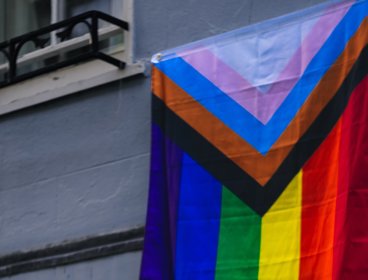By Cathy McIlwaine, King's College London
Gender-based violence remains one of the most pressing issues of our times. This is illustrated by the fact that eliminating violence against women and girls is the first target (5.1) in the Sustainable Development Goal (SDG) 5 on gender equity. Yet, it still remains largely invisibilised due to widespread under-reporting and difficulties in researching it. This relates to the dangers of re-traumatising women who may be too afraid or upset to speak about physical, sexual and/or psychological hurt or not acknowledging abuse as violence. When women do agree to speak there are ethical implications of ensuring that immediate support and longer-term signposting to services are available beyond the interview domain. Therefore, conducting research on gender-based violence with integrity is only possible through a collaborative co-produced approach with third sector organisations, preferably those who work from an explicitly feminist perspective.
Geographers, and especially feminist geographers, are very well-placed to conduct research on gender-based violence. These researchers identify the need to adopt a multiscalar perspective that can capture direct forms of intimate partner and interpersonal violence in both private and public spheres, together with indirect violence of state violence and gendered discrimination in the economy and society. This ensures a move away from ‘victim-blaming’ women for not reducing risk factors such as leaving violent partners or not walking alone at night, towards understanding the underlying structural causes of gendered violence. A geographical lens is especially insightful when considering relational experiences of women living in marginalised circumstances in cities of the global South or as migrants in cities of the global North, especially from an intersectional perspective (to include race, class, sexuality, sexual orientation, disability).
My own research has focused on the nature of and resistance to direct and indirect gender-based violence among women living in the favelas of Maré in Rio de Janeiro in Brazil and with Brazilian migrant women in London. In both locations, the research was identified as necessary by our collaborating partners from the third sector. In Rio de Janeiro, I have developed an ongoing relationship with the community-based human rights non-governmental organisation (NGO), Redes da Maré, especially with their Casa das Mulheres (Women’s House) since 2016. I have also collaborated with the Federal University of Rio de Janeiro and the arts organisation, People’s Palace Projects [PPP] at Queen Mary University of London. In London, I have been working with the feminist migrant organisation, Latin American Women’s Rights Service (LAWRS) for over 20 years developing research, initially to raise the profile of the Latin American community in London through two projects (No Longer Invisible in 2011 and Towards Visibility in 2016).
In Brazil and the UK, this research was rooted in trust and partnerships developed over time to develop an approach that made sense for the NGOs in terms of creating relevant data that they required in order to address evidence gaps. All the research was co-designed with the organisations and conducted with them through combinations of academic researchers (myself and other researchers) and with local field researchers from the organisations (Jiménez-Yañez and McIlwaine, 2021; Rizzini Ansari et al., 2023). When researching sensitive issues such as gender-based violence it is inappropriate for ‘outsider’ university researchers to ‘parachute’ into communities and extract data from research subjects as a one-off process. Collaborations must be fostered at the outset so that the research is conducted in a co-produced manner. Of course, this takes time, often involving potentially working as a volunteer and/or trustee, attending events and building rapport with organisations. This can be challenging for students and early career scholars, but certainly not impossible.
A key aspect of working with civil society organisations, particularly on gender-based violence, is ensuring that research findings are available as open-access and easy-to-read reports. In the London research, we published these in long and abbreviated forms, as well as in English and Portugese. Likewise, in Rio de Janeiro, we published multiple reports in English and Portugese. Also integral to our approach to visibilise gender-based violence through ethical and collaborative partnerships, has been engaging with the arts. This has included working with Brazilian artists who have produced creative interpretations of our research. In London, Gaël Le Cornec created a play, Efêmera, which also became a film, Ana, while in Rio, Bia Lessa developed a multi-media installation, SCAR, as part of the Women of the World Festival in 2018. I have also developed work with survivors using applied arts methods through my collaboration with Migrants in Action who produced a creative reinterpretation of the research in London. In Rio, we developed digital storytelling exploring how community artists community artists resisted gender-based violence in partnership with Redes and an online Museum, Museu da Pessoa. Finally, another collaboration with the Latin America Bureau brought all this research together through creating a multilingual (English, Spanish and Portuguese) podcast series on Women Resisting Violence (including a blog and book).
This type of collaborative geographical research is time-consuming and does not generally get recognised within an academic system that generally requires peer-reviewed research in specific outlets. Yet, it is not only essential in order to conduct ethical and meaningful research that can transform how people think about gender-based violence, but it is also incredibly rewarding.
Summary
-
A feminist geographical approach provides important insights into thinking relationally about direct and indirect gender-based violence among those living on the margins.
-
Conducting ethically sound research on gender-based violence is only possible through a collaborative co-produced approach with third sector organisations developed over time.
-
Results of research on gender-based violence need to be shared in open-access, easy-to-read, and multilingual formats. Engagements with artists and arts organisations provide rewarding ways of communicating and understanding gender-based violence.
Card image: Cathy McIlwaine
How to cite
McIlwaine, C. (2023) Understanding gender-based violence on the margins. Working with voluntary and community groups. Royal Geographical Society (with IBG) Guide. Available at: https://doi.org/10.55203/APCC4029
About this guide
Working with voluntary and community organisations for some is a very important way to do geography. These organisation come in various shapes and sizes and may also often be referred to as the third sector, the voluntary sector, not-for-profit organisations, community groups or the civic sector. In this guide, we share the experiences of researchers doing geography in collaboration with community and voluntary organisations. A range of topics and issues are explored from health, disability and care, through to austerity, violence, and craft, amongst others. We learn about the approaches taken by geographers in their work with community and voluntary organisations, and some of the challenges they have negotiated in the process.




